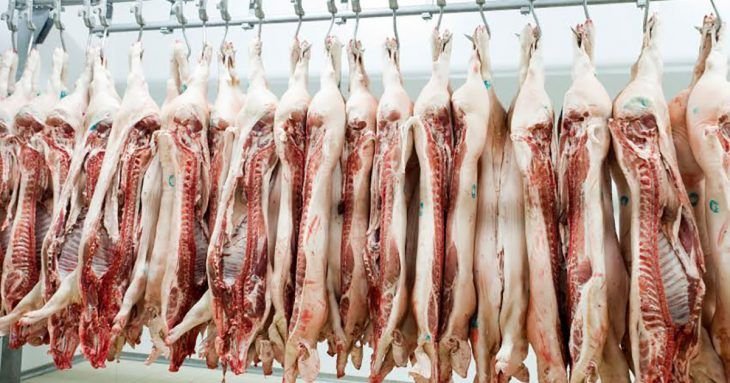Hidden hunger describes plants that look healthy but are experiencing a nutrient deficiency that could harm yield, said Trent Roberts, professor and the Endowed Chair in Soil Fertility Research for the Arkansas Agricultural Experiment Station. A deficiency in potassium, also called potash, can eat into potential profits for soybean producers.
“You reduce photosynthetic rate and reduce water use efficiency,” Roberts said. “The overall productivity of the plant really drops.
“If you have an 80-bushel soybean crop and you’re losing 10 percent yield, that’s eight bushels of soybean, and you start talking about $14 per bushel, now all of a sudden we’re talking $100 per acre that you’re not able to capture because of this deficiency you don’t know about,” Roberts said.
Last month, Roberts and other scientists with the experiment station, the research arm of the University of Arkansas System Division of Agriculture, published research in the Agrosystems, Geosciences & Environment journal that gives producers new recommendations in the fight against hidden hunger.
The goal? Maximize yield and boost profits for soybean producers.
“Anything we can do to maintain sufficient potassium availability just means higher yield potential,” Roberts said. “That’s just more profit for the producer.”
The study was conducted by Roberts and Carrie Ortel, a crop, soil and environmental sciences doctoral student in the Dale Bumpers College of Agricultural, Food and Life Sciences at the University of Arkansas. Other collaborators included doctoral student Kyle Hoegenauer, assistant professor of precision agriculture Aurelie Poncet, professor and soybean extension specialist Jeremy Ross, and Nathan Slaton, associate vice president for agriculture and assistant director of the experiment station.
Roberts said one surprising finding wasn’t an objective of the study, which was conducted on five producer-managed commercial production fields around Arkansas.
“One of the biggest things that we found was 90 percent of these fields were deficient in potash, but they had no visual deficiency symptoms.”
In other words, they were suffering from hidden hunger.
Roberts sees a great opportunity in addressing this nutrient deficiency.
“If we’re able to effectively manage that, then that’s as much as 5 to 15 bushels of soybean per acre across the board that we can increase yields,” he said.
According to the U.S. Department of Agriculture’s National Agricultural Statistics Service, Arkansas harvested 3.15 million acres of soybean in 2022, with an average yield of 52 bushels per acre.
Tissue sampling is key
What makes hidden hunger so difficult to address is the lack of visual cues in the soybean plant, Roberts said. “A lot of producers assume they’re doing fine because they don’t see visual deficiency symptoms, and they could be losing 5 to 10 percent yield and never know it.”
Tissue testing has emerged in recent years as a way to evaluate fields for hidden hunger. Soybean plant material is analyzed in a lab to identify the concentration of potassium in the plant. If plants test below a certain threshold — called the critical concentration — the plants are suffering from nutrient deficiency and will lose yield potential, Roberts said.
“The purpose of this paper was really to define a sampling protocol for tissue tests in soybean,” he said. “So, what we really set out to do was say, ‘OK, how much variability in tissue nutrient concentration exists in our soybean fields?’”
With that information, the team was able to develop a protocol for producers to collect soybean tissue samples, including when, where and how many samples to collect per field.
New sampling recommendations
The researchers conducted grid sampling in one-acre grids at five producer-managed soybean fields in Arkansas in 2020 and 2021. The samples were analyzed in a lab to determine the average concentration of potassium in each sample at a given time and field location. The measured concentrations were compared against the critical potassium concentrations, Roberts said.
Through spatial analysis of the data, Roberts said the team found no benefit to high-resolution grid sampling. The data showed no indication that concentrations of potassium in soybean tissue varied within a given field management area — a segment of land with similar conditions defined to help fine-tune management decisions.
Roberts said the biggest recommendation coming from the research is that composite sampling is sufficient to capture the variability of soybean tissue samples within management areas.
“The data basically told us there’s no benefit from grid sampling,” he said. Instead, a composite sample consisting of at least 18 of the uppermost fully expanded trifoliolate leaves will be representative of the management area. Trifoliolate leaves are compound leaves composed of three leaflets.
Eliminate the guess work
The next step for the researchers is to develop a set of calibrated potassium fertilizer rates to give producers site-specific recommendations for in-season applications.
“A producer can go out and sample their field and identify whether or not their potassium is adequate. And then based on that tissue concentration, if it’s deficient, we can basically take the tissue concentration and provide a calibrated fertilizer rate,” Roberts said. “The real exciting part is this idea that now we know how to sample, now we know how to interpret it, we can take that tissue concentration and give you a site specific in-season potassium fertilizer rate.”
The researchers hope to develop a decision support tool for producers to use by 2025.
Roberts emphasized that taking the guesswork out of production systems is the goal.
“Whether it’s soybean or any of our other crops, we’ve got a lot of tools out there,” he said. “Whether it’s soil sampling, tissue sampling, there are ways that you can help manage your production system to make sure that yield isn’t being limited and that you’re not spending money you don’t have to.”
This research was supported in part by the Soybean Checkoff Program, administered by the Arkansas Soybean Promotion Board.
To learn more about Division of Agriculture research, visit the Arkansas Agricultural Experiment Station website: https://aaes.uada.edu/. Follow us on X at @ArkAgResearch. To learn about extension programs in Arkansas, contact your local Cooperative Extension Service agent or visit www.uaex.uada.edu. Follow us on X and Instagram at @AR_Extension. To learn more about the Division of Agriculture, visit https://uada.edu/. Follow us on X at @AgInArk.





















